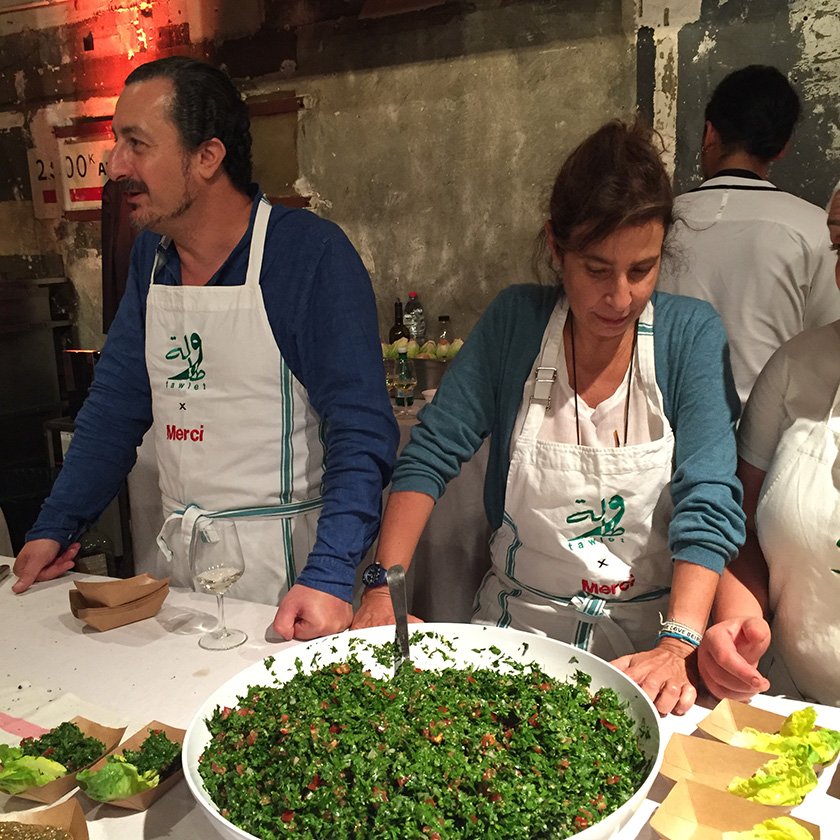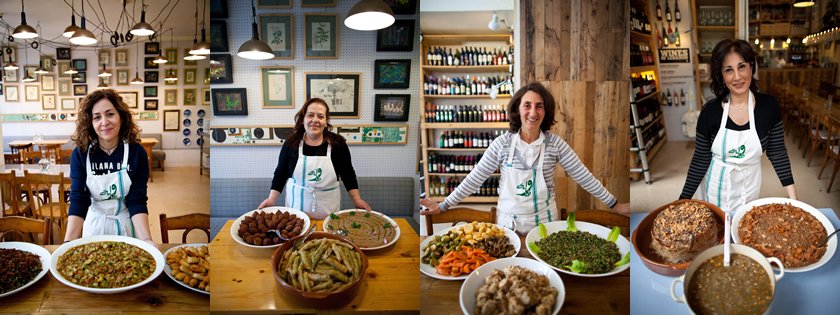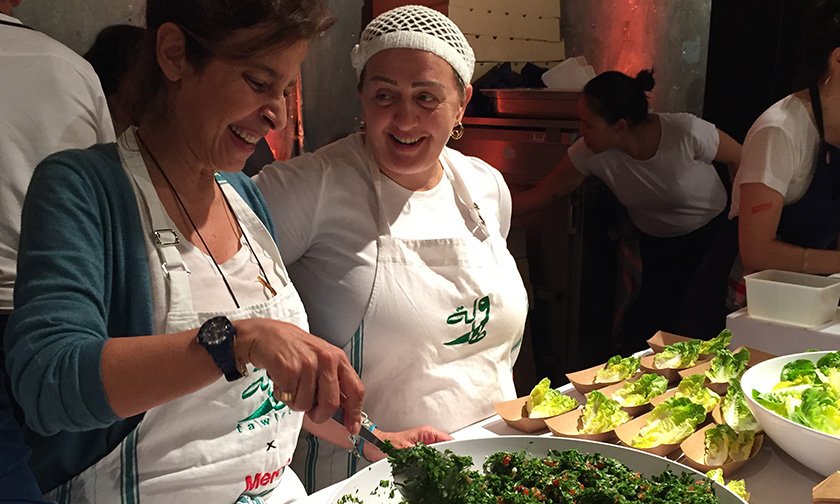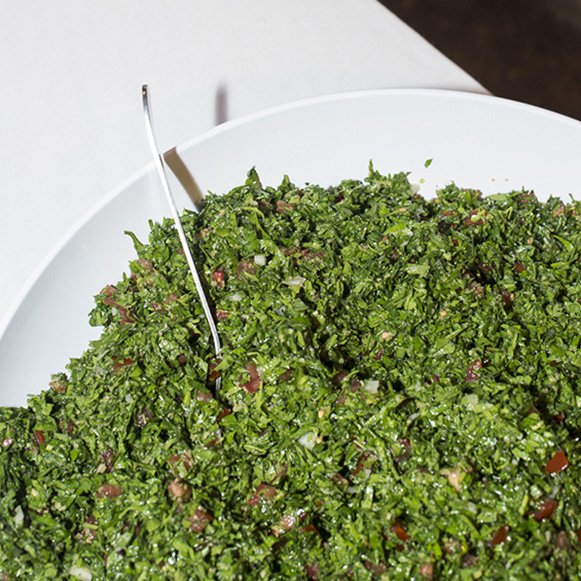- #Cooking
- #Empowerment
- #Entrepreneur
- #FarmersMarket
- #FoodActivist
- #MakeFoodNotWar
- #Peace
- #Producers
- #ReligiousCoexistence
- #Traditions
- #Women
How does one live in a civil-war-torn country? What can bring together people of different communities, cultures and religions, who only yesterday used to kill each other? What universal language should one use to bring together a divided, multi-faith population? In order to take part in rebuilding his native Lebanon, Kamal Mouzawak chose a common, vital need: food. For more than 10 years, he has created places where people can exchange and interact peacefully: Souk El Tayeb, a farmers’ market to connect city and country folks; Tawlet, co-operative restaurants to allow all to taste and enjoy every region’s unique specialties; Beit, guest houses that preserve and showcase architectural and culinary traditions. And all these endeavours share one motto: ‘Make food, not war !’

After studying graphic design, Kamal Mouzawak travelled around Lebanon, which was something impossible until then due to the civil war. As he discovered various regions and populations, he was moved as much as shocked by the realisation that those who previously killed each other for religious or political reasons, are in fact « all human beings, very similar and equally welcoming… » As a tour guide and later as a travel and food writer, he is eager to make the many beauties of his country better known.
With an approach he equates to an anthropolgist’s, he takes an interest in « the why, and above all the how. How can we make people change to make peace – i.e. life – prevail? » Kamal Mouzawak « cannot understand one should be identified according to 3,000-year-old religions, and does not accept the fact that faiths shoud be grounds for killing. » He wants to be a force for peace, to generate positive encounters between the citizens of his country, and to unite them around positive life projects.
Showcasing local farming and inter-faith encounters

Kamal Mouzawak chooses to celebrate what is common to all communities: the land they live on, they love and respect. With cooking as a universal means of communication, that showcases this land’s wealth of farm products and culinary traditions, regardless of individual beliefs.
The son of a farming family, in 2004 Kamal Mouzawak came up with the idea to create the country’s first small-scale farmers’ and producers’ market: Souk el Tayeb. From a dozen producers initially, it has now grown to a hundred, who come twice a week from all regions in Lebanon to sell their produce in the center of Beirut. The products are fresh, local and in-season. This was Kamal’s first project : to make farmers of all faiths work together, « regardless of their race, religion or political affiliation. » The Souk is a place of peace and unity for communities which were previously torn apart. A place where Sunni and Shia muslims and Christians of all denominations sell and buy their food.
The Souk has also become a lively place where city and country folks mix. « The direct contact between producers and consumers shows the human side of farming. It showcases the work of small family farmers, it celebrates them and gives them recognition for what they do. Their very presence allows them to pass on their know-how, preserving age-old traditions for future generations. »
More than a third of the Souk offers certified organic produce. It also sells traditional crafts : earthenware, soap bars, etc. Children’s workshops offer educational games and activities, around the history of earth, of farming and of the arts.
And from an economic point of view, the Souk also safeguards the interests of small farms as they face competition from industrial producers.
Souk el Tayeb. D’une dizaine de producteurs au départ, ils sont une centaine aujourd’hui à venir de toutes les régions du Liban et à vendre leurs produits deux fois par semaine, en plein air, dans le centre de Beyrouth. Les produits proposés sont frais, locaux et de saison.
When the story of a dish tells a country’s History

While he pays homage to those who till the earth, Kamal Mouzawak also wants to shed light on the women who at home use these products and turn them into maginificent traditional dishes. He wants to celebrate their unsung work as well as safeguard their recipes, which are part and parcel of the country’s wealth.
This is why he opened Tawlet, a co-operative restaurant, in Beirut. Every day from Monday to Friday, a different woman comes to the restaurant’s open kitchen and cooks her region’s specialties, to be served on communal tables.
Kamal opened Tawlet’s kitchen first to women who had long lived in Lebanon, then to refugees from Palestinian camps, and lately to Syrian refugees. « In general these women could not take anything with them when they left. Except the most genuine and sincere expression of their history: their recipes. By using them and explaining them to others, they find a new place in society and can gradually reach financial self-reliance. »
With their dishes, they help wealthy guests discover the country’s culinary traditions. « Every woman acts as she would in her home. She talks about herself and shares her family’s and her village’s stories, by means of her cooking. »
This is an opportunity to meet housewives or refugees, all of them amateur cooks who add their love, their personalities and their regions’ histories to their dishes.
Within those informal teams, religious or political commitments matter very little. What everyone, cooks and guests together, is sharing and talking about, is a passion for good food and the joy of sharing tasty dishes !
In keeping with the original idea, Kamal Mouzawak’s ideas bring communities together and preserve traditions. But they also allow the women who take part to gain independence.
Some of them, who used to be housewives, have moved on to become entrepreneurs. Many women have started their catering or restaurant businesses. The stories of Georgina Al Bayeh and Rima Massoud are interesting for more than a few reasons.
Georgina, from housewife to entrepreneur

Born in Kfardlekous, a village in northern Lebanon, Georgina Al Bayeh studied psychology. After her children (3 boys aged 19, 16 and 14 now) were born, she dedicated herself to raising them and cooking her best dishes for them. But she felt bored when they were at school…
One day, she heard about Kamal’s endeavours, and got in touch with him on Facebook. First to sell the olive oil her family has been making for 80 years, in their region’s high plains. And then to cook at Tawlet.
She was used to cooking every day for the 5 people in her home, and sometimes for 15 to 20 people for family gatherings. But then she would have to cook for 60 and more… While she was very impressed in the beginning, she quickly got used to it and enjoyed it. She has now become quite efficient, and she has created her own catering business, offering produce and dishes from her region. Her specialties are war’a inab atee (stuffed vine leaves), mjadrat el loubieh (red lentil, bulgar and fried onion stew), kebbet laqtine (bulgar, beef and squash balls), etc.
Thanks to support from her family, this activity has given Georgina a sense of fulfillment. She is regarded as a model of self-reliance in her village, and she has no intention of stopping there ! She is thinking of giving cooking classes in her house and offering with them visits of the family olive groves.
Rima: keeping traditions and safeguarding the environment

Rima Massoud ran a restaurant in Chouf, a natural area South-East of Beirut, in Mount Lebanon. She served seasonal products provided by local farmers. After her chidren were born, and when she had to take care of her family’s fruit orchards, she was forced to move away from the stove. But she had always liked being in contact wih people, so she took the opportunity of Souk El Tayeb to showcase her products and her beloved region.
Since 2005, Rima has been taking the 1-hour drive to Souk every week. Helped by her children (two boys now aged 30 and 26, and a girl aged 15), she sells her peach and plum (typical Chouf fruits) mounehs*. Her compote, made with peaches from her farm, has become very popular and is now sold as part of the Souk El Tayeb range.
Rima has also changed her farm, which now bears the Liban Cert organic ceritificate. It now grows vegetables too, with a more sustainable approach.
Rima also shares her experience with the other villagers, by turning the other local organic farmers’ products into mounehs*, and by encouraging youngsters to stay in their villages and help their elders work their farms, as her own children do.
She is a symbol of personal success, and her story has had an influence on her relatives and neighbours, brought the community together, and helped perpetuate local traditions.
While Souk El Tayeb and Tawlet bring producers and cooks to town, Kamal Mouzawak also wants to take townsfolk to the country – « to the land that feeds them. »
This is why he has created the ‘Food & Feast’ events, that showcase local cultures and culinary traditions in various villages in Lebanon.
He has also created Beit, bed & beakfast houses, to preserve the architecture and lifestyle of Lebanese regions, in Douma, El Qamar and Ammiq.
Kamal Mouzawak is not short of ideas to bring his country back together. As he has adopted Gandhi’s motto – « Be the change you want to see in the world » – he is now a major player for positive change, in a manner that is both peaceful and respectful of all traditions. In Lebanon today, and possibly somewhere else soon…
Definitely a food activist and a social entrepreneur worth following !
*Mouneh : a jar of preserved fruits or vegetables. In Lebanon it is an age-old, traditional way of keeping food products in the house pantry to use them in the kitchen all year long.
- 1975-1999 : Lebanese civil war
- 2004 : First farmers’ market, Souk El Tayeb, in Beirut
- 2007 : First ‘Food & Feast’ event in a province
- 2009 : First Tawlet restaurant opened
- 2015 : First Beit B&B house opened

Find the recipe




